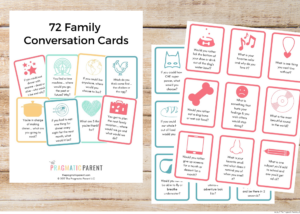Inside: Should kids have cell phones? Learn the benefits and drawbacks of giving your kids’ cell phones, along with helpful tips for safe use. Plus, if you go the cell-phone route, my family’s personal favorite is Gabb Wireless phones for optimal safety and affordability.

Should Kids have Cell Phones?
Cell phones cause a great divide. These handy little devices are likely on you at all times – a tool for communication, navigation, and procrastination. And while we may be happy using cell phones ourselves, many parents are unsure about letting their kids do the same.
There’s a tricky balance to giving your kids cell phones; they hold the power to both keep our kids safe and potentially put their safety at risk.
So when deciding for your family, it can be helpful to weigh the pros and cons.
Benefits of your Child Having a Cellphone
Some pros as to why kids should have phones include:
- Navigation – Kids can use map apps to help them walk home from school, take a bus, or get them home if they’ve lost their way.
- Safety – In case of an emergency, it’s important to be able to call for help, whether that be parents or emergency services.
- Communication – With conversations at their fingertips, kids can stay in touch with family members and friends from around the world!
- Creativity – There are several apps and platforms where kids can get creative through digital art, video, writing, and more.
- Connectivity – Cell phones offer the latest news both in personal circles and on a global scale.
- Education – Learning apps and translation tools can benefit a child’s education.
- Media literacy – A new and important skill, a cell phone can help jumpstart a child’s media literacy which they’ll need throughout their life.
Drawbacks of your Child Having a Cellphone
Some reasons why kids shouldn’t have phones include:
- Screen time – There are harmful effects of excessive screen time, including vision issues and declines in both physical and mental health.
- Safety concerns – Safety is always at the forefront of cell phone concerns. With connectivity and online presence comes potential harm.
- Cyberbullying – Cell phones and computer use allow bullying to breach the walls of your home. The potential for cyberbullying is often a concern with cell phones.
- Expense – Phones aren’t cheap. Kids have the potential to lose or damage their phones if they aren’t ready for the responsibility yet.
- Sleep – Screen use before bedtime can affect your sleep cycle and cause harm to your sleep.
- All-consuming – Because cell phones offer so many possibilities, they can be all-consuming and limit physical activities and creative time.
So, should kids have phones? In the end, it’s a personal choice. Each family has different needs and will benefit differently from giving their children phones.
Being aware of both the potential benefits and dangers of giving your child a phone will help you make an educated choice.
What Age Should You Get a Phone?
Once again, this will depend on the needs of your family and the individual child.
Experts suggest waiting until kids are at an age where they can competently understand internet safety and have conversations about cell phone use.
At 13, these conversations are very possible. Plus, this is the minimum age for most social media platforms, making it a natural choice.
Still, there is no perfect age for getting a cell phone, and tech needs will look different for every family.
For example, kids walking home from school, attending daycare, or going back and forth between caregivers could benefit from having a cell phone at a younger age.
In general, you may want to consider giving your child a cellphone between the ages of 10-14.
Tips for Kids and Cellphones
Deciding whether or not to give your child a cell phone isn’t as simple as saying yes or no; if you choose to give your child a phone, this is an active commitment to maintaining safe cell phone use within your family.
Here are a few tips for managing kids and their cell phones to ensure their safety and teach them basic media literacies:
1. Limit their screen time
- Excessive screen time is harmful to anyone. And children may have more difficulty self-regulating their device usage.
- Set clear rules about phone usage; decide how much active screen time is allowed in your house and be firm with it!
- Experts suggest children above the age of 5 have no more than two hours of recreational screen time per day.
- And for the best use of this rule, model it! Limit yourself to the same screen time guidelines to model its importance.
2. Keep phones out of bedrooms
- Cell phones are bad for your sleep; it’s easy to stay up all night scrolling. Plus, the blue lights emitted from your screen damage your sleep pattern.
- Set a rule that phones are banned from bedrooms. You can even set up a docking station in an open space like the living or kitchen, where phones spend the night.
- This routine will help with enforcement.
3. Monitor phone use
- While children are absolutely entitled to their privacy, online activity should be monitored, especially at a young age.
- Ask that your kids use their phones in open living spaces while at home.
- 6 Popular Parental Control Apps and Software to Safeguard Kids Online
4. Set clear rules and boundaries
- Be clear about your expectations with screen time, monitoring, and overall phone usage. That way, there are no surprises when it comes time to enforce the rules.
- You can use helpful visuals like this printable screen time checklist to give children an active role in monitoring their device usage!
5. Talk about online safety
- Online safety is an ongoing conversation.
- Before giving your child a cell phone, have an open conversation about the potential dangers of being online, along with preventative safety rules.
- Here is a helpful post about online safety.
- Protecting Tweens and Teens Online: Parental Tools
6. Choose a kid-friendly phone
While children might not be ready for a top-of-the-line smartphone, there are several kid-friendly phones on the market that may be a better choice.
This might look like a “call-only” model or a budget-friendly option.
So, what are the best cell phones for kids?
Phones with built-in web filters, like the Bark Phone or the Gabb Wireless phones (which my family uses the watch for our two 11-year olds and 8-year old), are ideal for younger children.
For teens, models with more freedom, like the Google Pixel 6a or the iPhone SE, provide endless possibilities at reasonable price points.
7. Use safety apps
You can turn on applications like “Find my Friends” to track your child’s whereabouts.
These safety apps can actually allow children more freedom because, as a parent, you’ll know their location and can feel safe in allowing them a little more independence.
More information on the dangers of Popular Social Media Apps & Setting Limits with Technology
Read: 6 Popular Parental Control Apps and Software to Safeguard Kids Online
8. Teach phone etiquette
We could all use a bit more phone etiquette!
Teach (and model) good phone usage rules like:
- No phones at the dinner table
- Putting your phone down when you’re speaking to someone
- Avoiding phone use during family time
- Turning your phone off at the movies
- Prioritizing face-to-face communication over digital communication
9. Learn skills both on and off the phone
Cell phones are a tool; when giving your child a cell phone, make sure you teach them basic skills on how to use them for their personal safety.
Show them how to use maps, how to dial the phone, and how to access phone numbers.
In addition, teach these skills for when a cell phone isn’t a possibility! You never know when you may run out of battery.
Basic navigation skills and memorizing your home address and your parent’s phone numbers are necessities.
10. Age restrictions
For social media apps, accounts are almost always restricted by age. Major platforms, including Instagram, Facebook, Twitter, and Pinterest, all require you to be at least 13 years old when signing up.
Other platforms like Youtube have kid-specific safety features on children’s videos, including age restrictions and no advertisements.
To ensure safe usage, download and sign up for apps with your children. Input their correct age to make use of these built-in safety nets.
11. Restrict online access
If you’re skeptical about allowing your child access to the internet, you can purchase kid-focused cell phones that allow zero online access.
They’ll still be able to use helpful features like calls, maps, and fun apps without any online presence.
12. Use the phone to your advantage
While giving your child a cell phone is complicated in terms of safety, there are several advantageous aspects as well.
Encourage the use of learning apps, media creation, and child-safe platforms.
The Bottom Line: Should Kids have Cell Phones?
If you’re actively monitoring your child’s cell phone use, having regular conversations about online safety, and putting in place firm usage rules, children can absolutely benefit from having a cell phone.
Still, this is a personal choice, and there is no right answer for everyone.
Ask yourself, why does my child want or need a cell phone? Is it going to be more harmful or beneficial to their safety?
These basic questions will help guide your choice.
Additional Resources on Parenting and Technology:
- 6 Sneaky App Cloning & Hiding Apps: How to Identity & Remove Them
- 6 Popular Parental Control Apps and Software to Safeguard Kids Online
- Unsafe Information About Your Kids You May Be Posting Online Without Knowing It
- Dangers of Popular Social Media Apps & Setting Limits with Technology
- 10 Simple Ways to Limit Screen Time & Raise Unplugged Kids
- Printable Screen time Rules Checklist for Kids (PDF)
- The Harmful Effects of Excessive Screen Time for Kids
- It’s Time to Say Goodbye to This Bad Parenting Habit: Break Your Smartphone Addiction






